Right To Say No – From Ecuador to Belgium
The first event we held was the KickOff with numerous Catapistas who were very interested in learning about Danila and Natalia’s work. A welcome that we held at De Kleine Sikkel (Ghent).
During that weekend, in addition to preparing the future meetings and events planned for the coming days, Danila and Nathalia were able to learn more about the culture and architecture of Ghent, and participated in a dialogue in Pandenmisten together with activists from different parts of the world.
On Monday 27th February we held a meeting with members of EEB and the international coalition Right To Say No. The week continued with a meeting with the UN Special Rapporteur on the situation of environmental defenders Michael Forst. A very relevant meeting in which Danila and Nathalia were able to share in first person the reality that environmental defenders live in Ecuador.
The day continued with a networking event with the Global Right To Say No coalition, an event where defenders and activists from different territories worked together. The day ended with the event Putting Rights First in the Green Transition – Due Diligence, Environmental Justice and the Right to Say No which was held at the European Parliament. At this event, activists from Ecuador, Brazil, Sweden, Indonesia and Chile were able to present to MEPs the consequences and impacts of extractive industries on the rights, lands and environments of indigenous peoples worldwide.
The week continued with different events with students in Brussels, Ghent and Antwerp, as well as a dialogue table with numerous organisations that make up the Belgium and Latin America and the Caribbean Platform, which is coordinated by 11.11.11.
In order to show the synergies between the struggles of Belgian and Ecuadorian communities, we organised the event: From Ecuador to Ghent: towards a world without mining. Through this action many citizens of Ghent were able to participate and learn how we can organise ourselves to work together against mining.
A couple of days later, Danila and Nathalia together with several Capatistas visited Plombières, one of the Belgian towns where mining has taken place. A day in which the defenders were able to learn about the history of mining in Belgium and the consequences it had on the area.
To mark International Women’s Day, we organised a round table discussion with Danila and Nathalia, together with Guatemalan activist Susana López. In this space, women comrades from Ecuador and Guatemala shared their realities regarding their right to say NO to mining projects, but also the personal and work situations in which the system says NO to them. Situations of discrimination and sexism that we must continue to fight to change.
The last public event in which the comrades took part was in Bruges together with the Masereelfond cultural fund. The event was very well attended by the public, who were able to learn how you can be part of the who could learn how you can be part of a movement that says “yes” to degrowth and “no” to mining.
The last day of this trip was the 8th of March. During the morning we had brunch at BOS+ together with members of the organisation. Afterwards we were given a guided tour of the Gontrode forest, where we could see how they work in the defence of the forests in Belgium and where Danila shared different experiences of how the communities protect the forest of Chocó.
The day ended with participation in the march for International Women’s Day. A day of vindication for the rights of women, especially women defenders of the territory.
CATAPA is grateful for the energy and knowledge that Nathalia and Danila shared in the many events that were organised. These two weeks have also been made possible thanks to the participation of numerous Catapists and organisations that have collaborated to raise awareness and synergies in order for the Belgian community to also take action against mining projects in Latin America.

Attending the Speaker Tour has been a very nice experience, in which I was able to share in front of different audiences the work done together with my organisation “Red de Jóvenes del Chocó Andino” in our territory, about the resistance of my community that has been threatened by extractivism for more than 30 years and my own experience living and working in this territory that I consider my home.
They were weeks full of activities where I had the opportunity to meet wonderful people who are fighting from their different places and positions against extractivism, the damage of nature and the destruction of the existing forms of life in the threatened territories. For me it was important to make known what we are experiencing in my community, as we often feel that we are not listened to, we feel that we are alone in the defence of our territories and that we are so distant from other realities; and to feel these gestures of support from other people, to feel that they listen to us carefully and are concerned about what happens to us and to establish links to work together, are situations that comfort us and give us strength to continue.
I am very grateful to CATAPA and to all the people who worked very hard to make the Speaker Tour happen, for making us get to know places with a lot of history (many of them inspiring), the culture, the forests and above all for making us feel at home. I also congratulate them for bringing these real voices of the territories that are threatened by extractivism; they want to erase us from our territories in order to take away all our natural wealth that we protect every day with the story of achieving a green transition. From this experience I take with me very pleasant memories, friendships, knowledge and the hope that we are working for a better planet for our future generations.

For me the Speaker Tour has been a very positive activity, where I have had the opportunity to make part of Belgian society aware of the impacts that
mining generates on indigenous peoples and women, peasants and Afro-descendants, it has been an opportunity to raise awareness on this issue. I would also like to highlight the advocacy work carried out in the European Parliament, as the discussion on the due process that European companies operating outside their territory must follow is transcendental and could have positive effects in Latin American countries.
On the other hand, the debate and the position on the right to say NO is also extremely important, as it includes the right to free and informed prior consultation and respect for the decision of the peoples to refuse destructive extractive activities that would destroy nature, ecosystems and ways of life in their territory.
The right to say NO to extractivism (oil, minerals, agro-industry/oil palm) means at the same time a YES to the life that already exists, to their own economies, to local ways of living well, to food sovereignty, to their own cultures where there is ancestral wisdom that is still unknown to Western societies.

On Friday, February 24, CATAPA volunteers came together to welcome Ecuadorian activists Nathalia Bonilla and Danila Andagoya. During a fun and inspiring evening in Ghent, the Catapistas discovered Danila and Nathalia’s stories about their struggle against mining around the Ecuadorian capital Quito. Danila and Nathalia, each in their own way, fight every day for the right to say “no” (internal left).
Their opposition to mining projects in their communities and within their organizations may seem far from our minds, but it is not. The uninhibited consumption of electronics, among other things, the green transition, individual electric mobility: our conscious and unconscious choices as a society have global consequences.
Catapistas believe that we also have the right to say “no” to uninhibited economic growth and our current economic model. The right to say “no” is always prohibited to a “yes. We, along with many other movements and citizens, say ‘yes’ to a different way of organizing our society, .
Discover together with CATAPA what Nathalia/(and)/Danila can teach us about the right to say ‘no’. During [name event] we will, through their story, take a critical look at the system that makes their struggle necessary. You will also immediately learn how you can be part of a movement that says ‘yes’ to de-growth and de-mining.

What can Ghent and Flemish activists learn from a struggle against mining in Quito, Ecuador? We found out on Sunday, February 26, at the Pandemists in the Peace House. During this interactive workshop we brainstormed about our work as activists and the importance of campaigning, shared techniques and good practices and found inspiration in each other’s motivations and perseverance.
Nathalia and Danila shared their story of struggle in Quito, where they succeeded in forcing the government to hold a referendum on mining in the region. Their mobilization, organization and long-term work brought out many stories of activists here in Belgium, and their preparations for actions and campaigns.
What came up specifically, from the European activists (there were also people from Germany, Slovakia and Turkey) was that resilience requires community, celebration and enjoyment of life. You can only fight a battle if you support each other, and humor and elation are needed from time to time so that we don’t lose hope in what is often a David versus Goliath struggle.
Each of us had our own background, perspective and story. A very diverse group to engage in conversation with, yet one thing was clear: activism, for a better, fairer, greener, more equal world is a long-term work and one struggle we all share. Telling our stories, what went right, what went wrong, how to do better, and how to always find inspiration and hope to keep going – that’s what we found together that evening. From Ghent to Quito, and back.

On Thursday, March two, Nathalia Bonilla was a guest at UGent’s Campus Boekentoren. Interested students and other people from Ghent came to listen to Nathalia Bonilla of Acción Ecológica, an organization in Ecuador involved in the Quito Sin Mineria campaign.
Nathalia delivered the message that the right to say no to mining projects is a right to say yes to life and nature. It is important to protect communities from extractivism because it often leaves them unhealthier, poorer and with fewer resources.
Our hunger for resources is fueled by our lifestyle and our belief that a green transition can still tolerate more consumption. This drives the expansion of mining projects, the costs of which are often borne by those who do not reap the benefits. Doing more with less and knowing what is enough is therefore becoming a key issue in the path to a just transition. Reuse, sharing, repair and circularity play a big role in this, both in everyday electronics and mobility.
Many interesting questions came from the audience: How did you get a referendum done? How many people did you mobilize? The commitment, drive and perseverance of our Ecuadorian activist inspired many a listening ear.
Our struggles are not unrelated: what happens in Ecuador has an impact on us, and vice versa. With the EU opening the door to large-scale mining projects in Europe, it is all the more important to strengthen and connect this global struggle for justice. To learn, to share, and to learn to share. A fight for a world without extractivism.

On Tuesday evening, March 7, there was the Conversation Night in Bruges, organized by CATAPA in collaboration with De Snuffel and the Masereel Fund. The Masereel Fund (named after artist Frans Masereel) is a progressive cultural fund that looks at today’s society from a critical angle.
It was the first time I was able to attend a CATAPA Speakers Tour event and I found the setting very successful. The audience was seated among various artworks and sculptures which added an extra dimension to Hanne and Danila’s stories.
Danila is an Ecuadorian activist who opposes the mining projects in her home area and is also committed to addressing the effects of mining that are harmful to the environment and the communities that live there.
It was the first time I witnessed Danila’s harrowing stories live. I had already read her story but hearing it once with her own words and experiences felt different, it was much more gripping and poignant this way. Often the effects of mining are a distant memory, but the way Danila told her story, full of passion and modesty, made me feel as if I had been there myself. In this way, it gave me extra motivation to help and support her (as well as other movements) against this injustice.





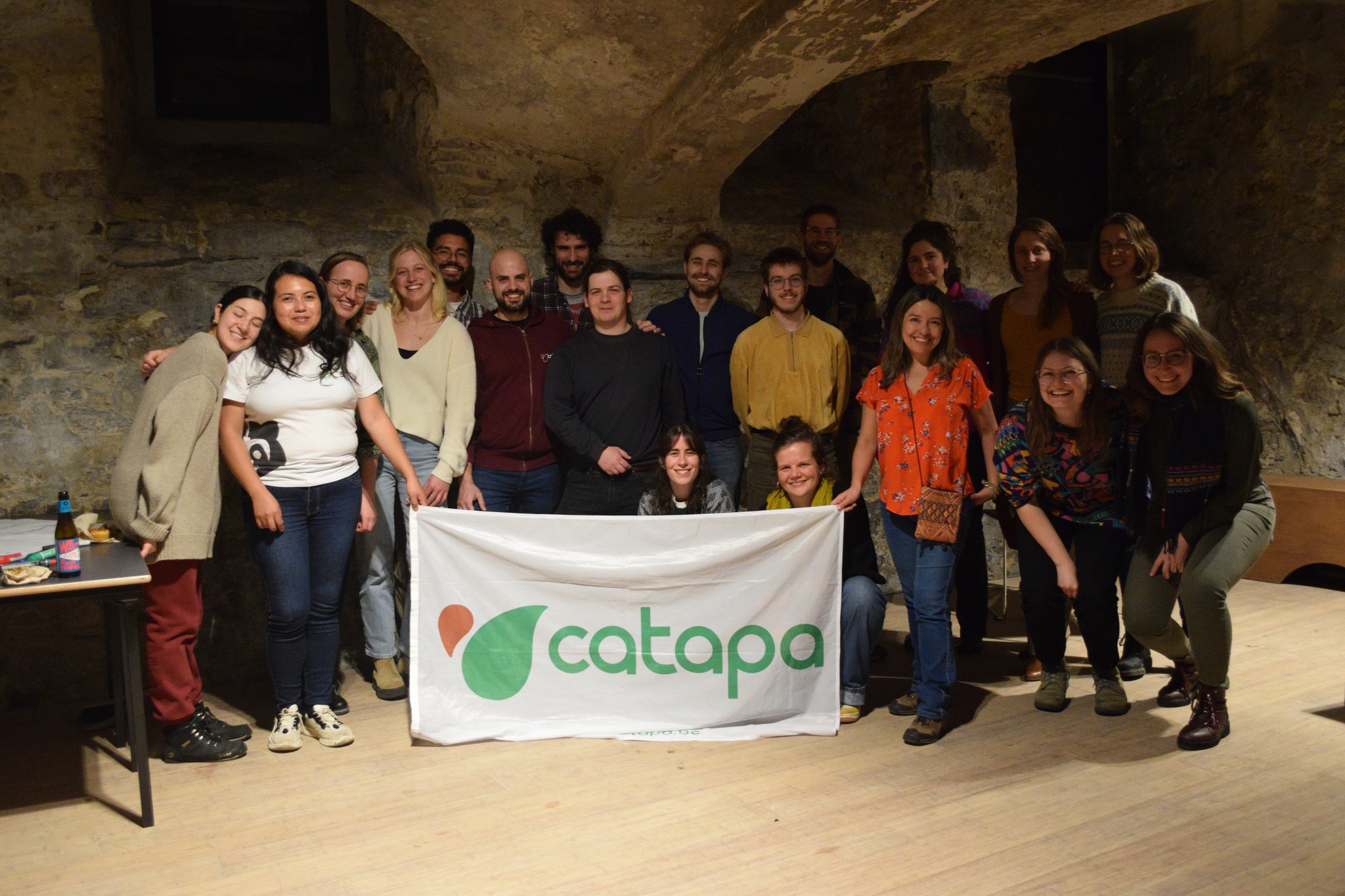























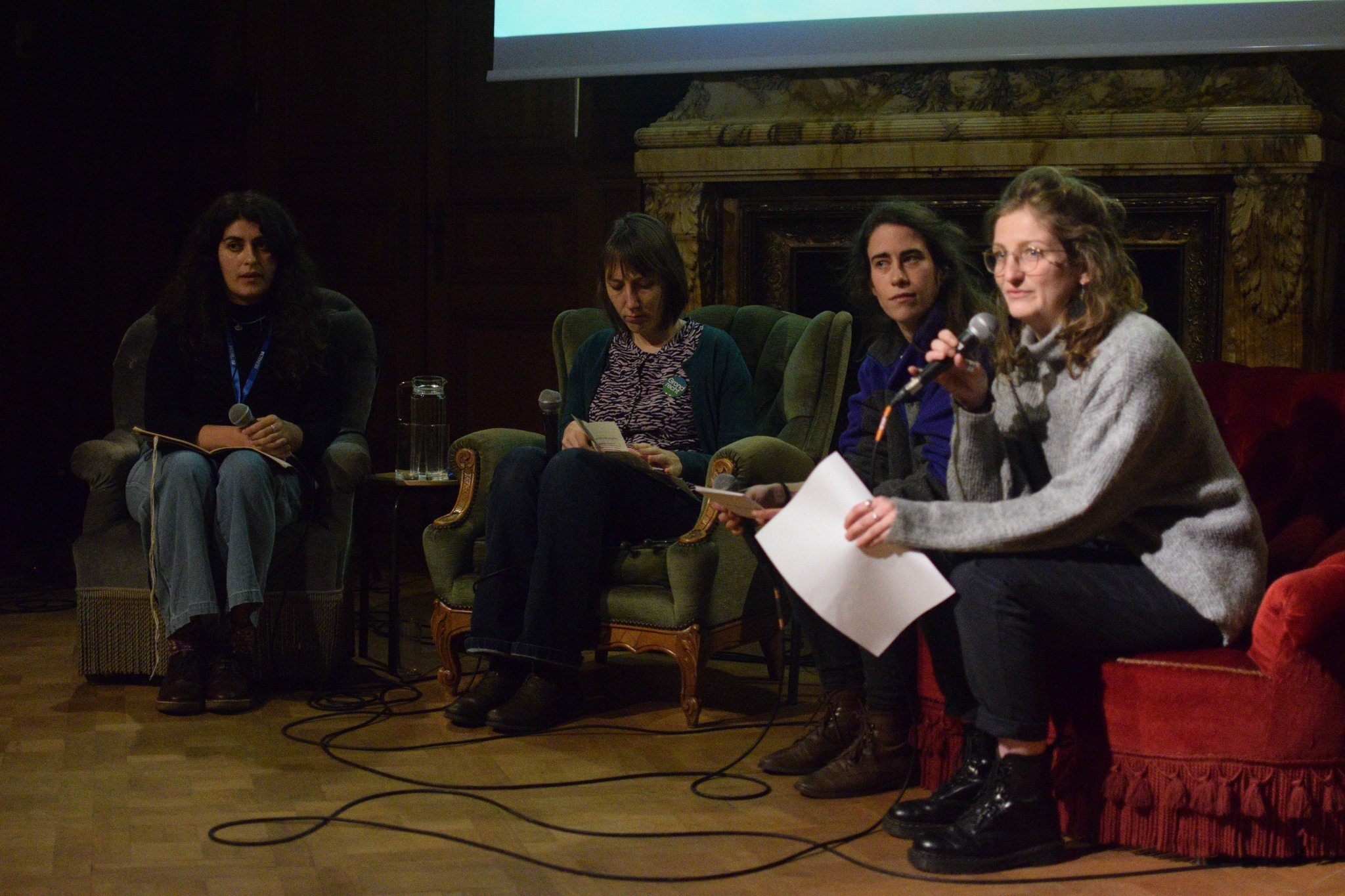







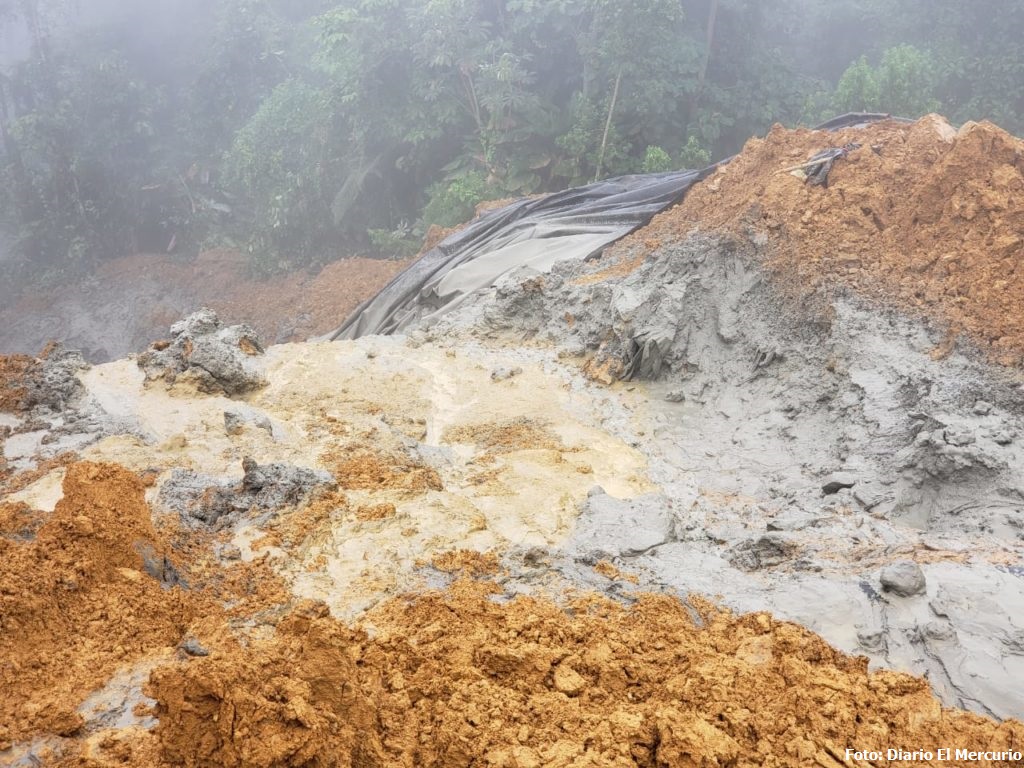


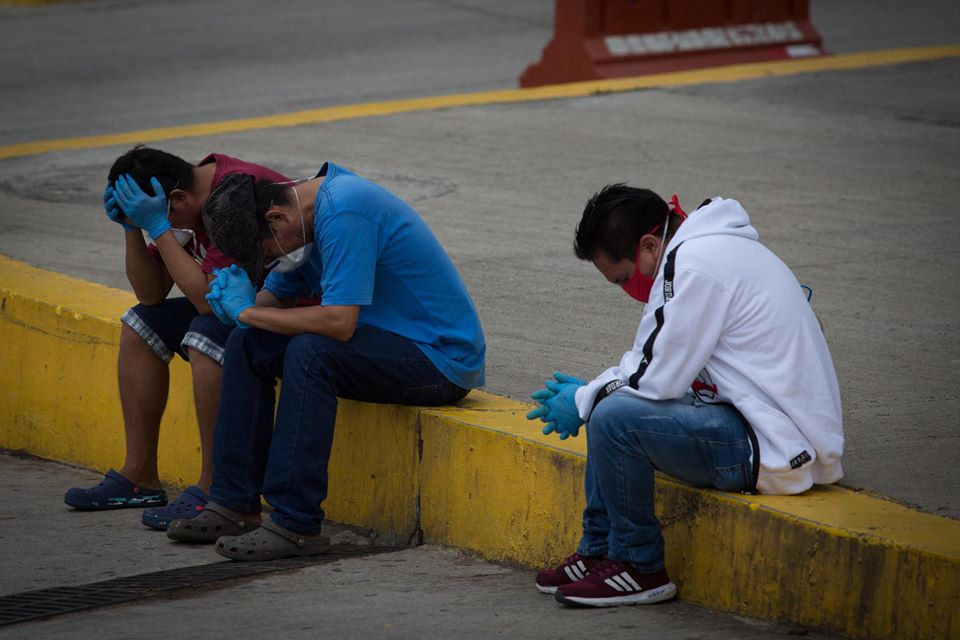





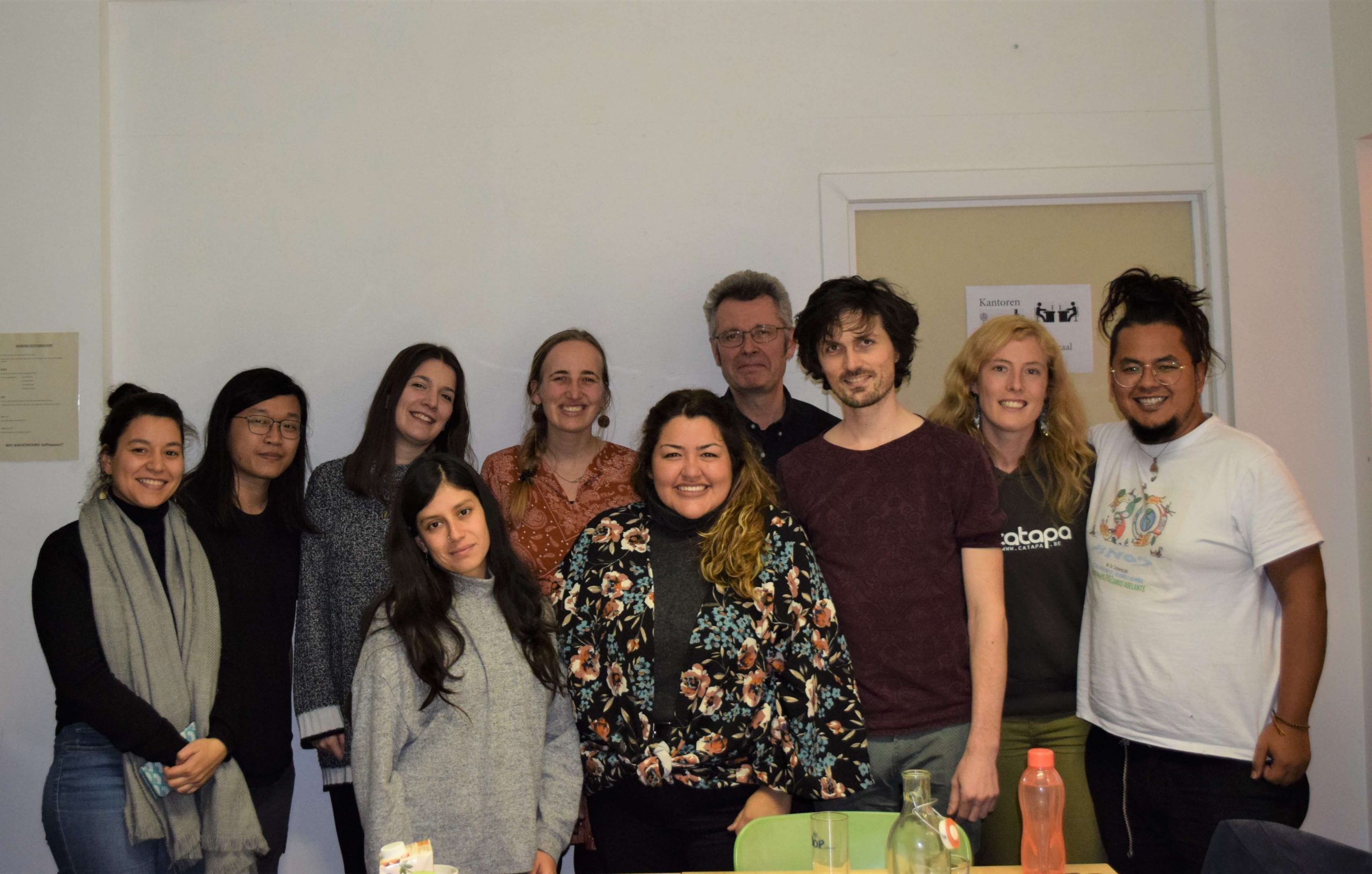





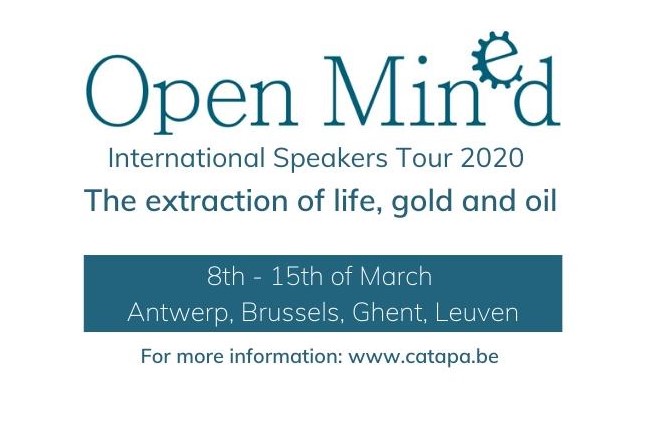

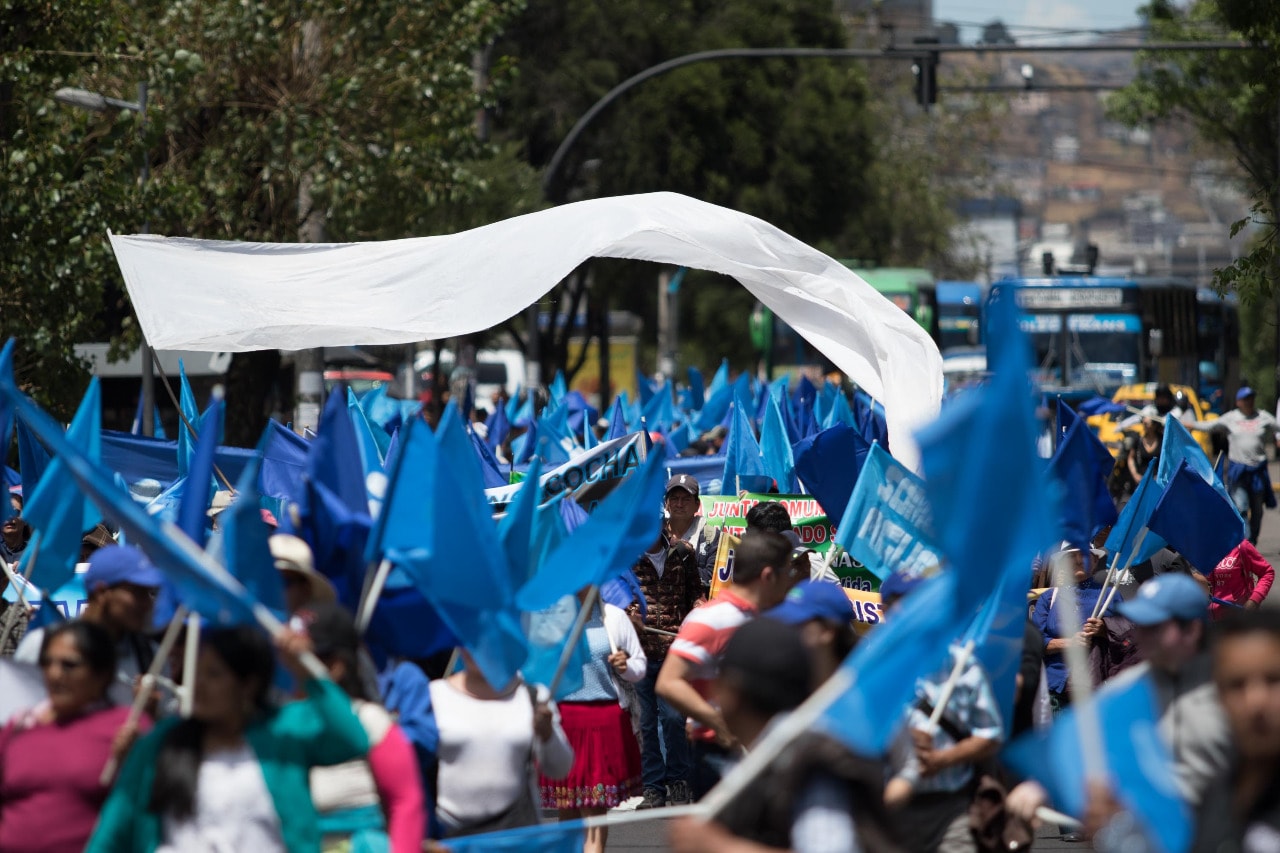




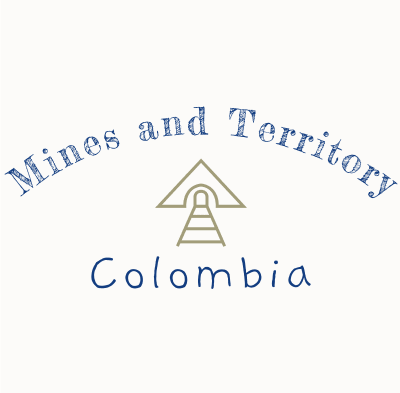
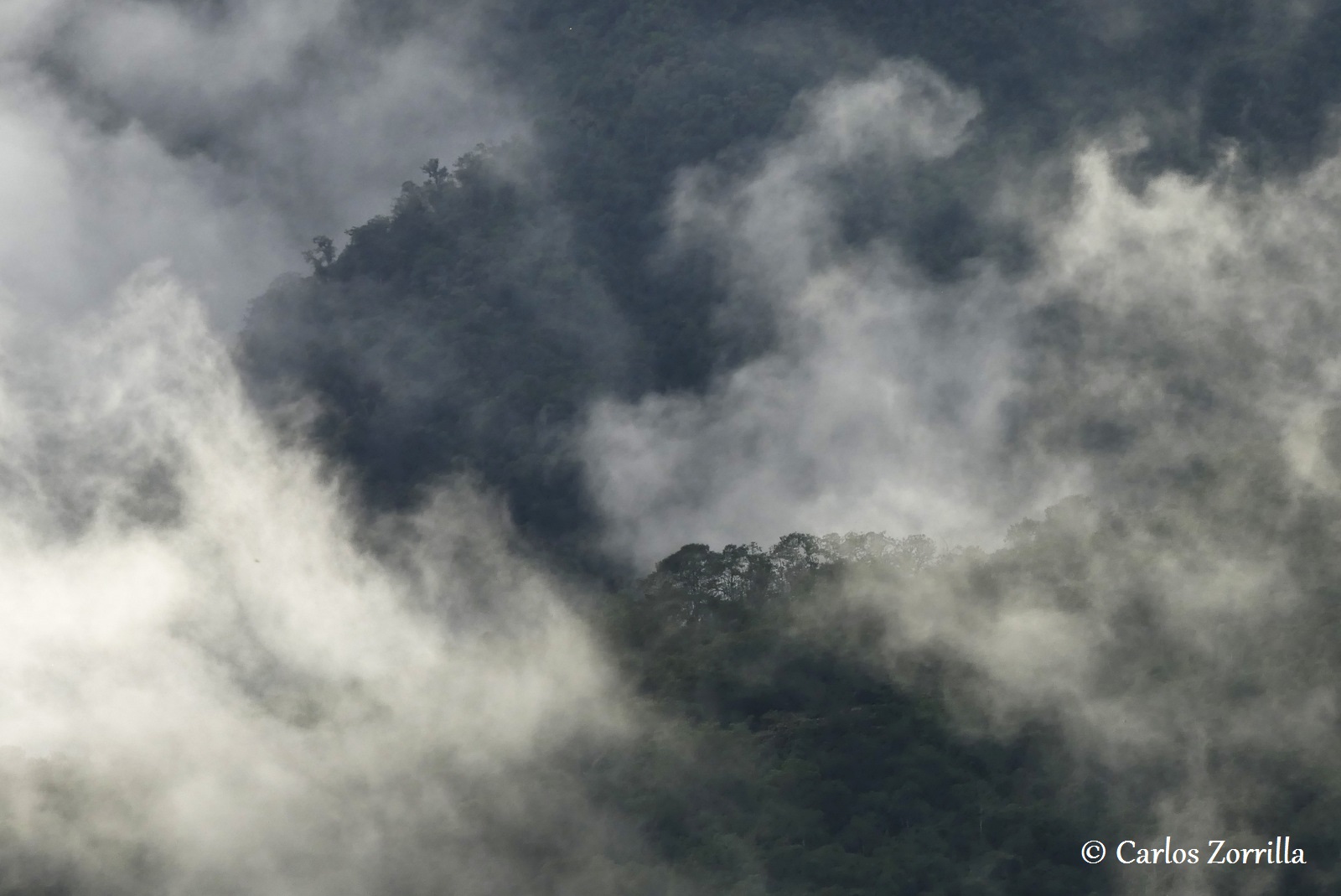
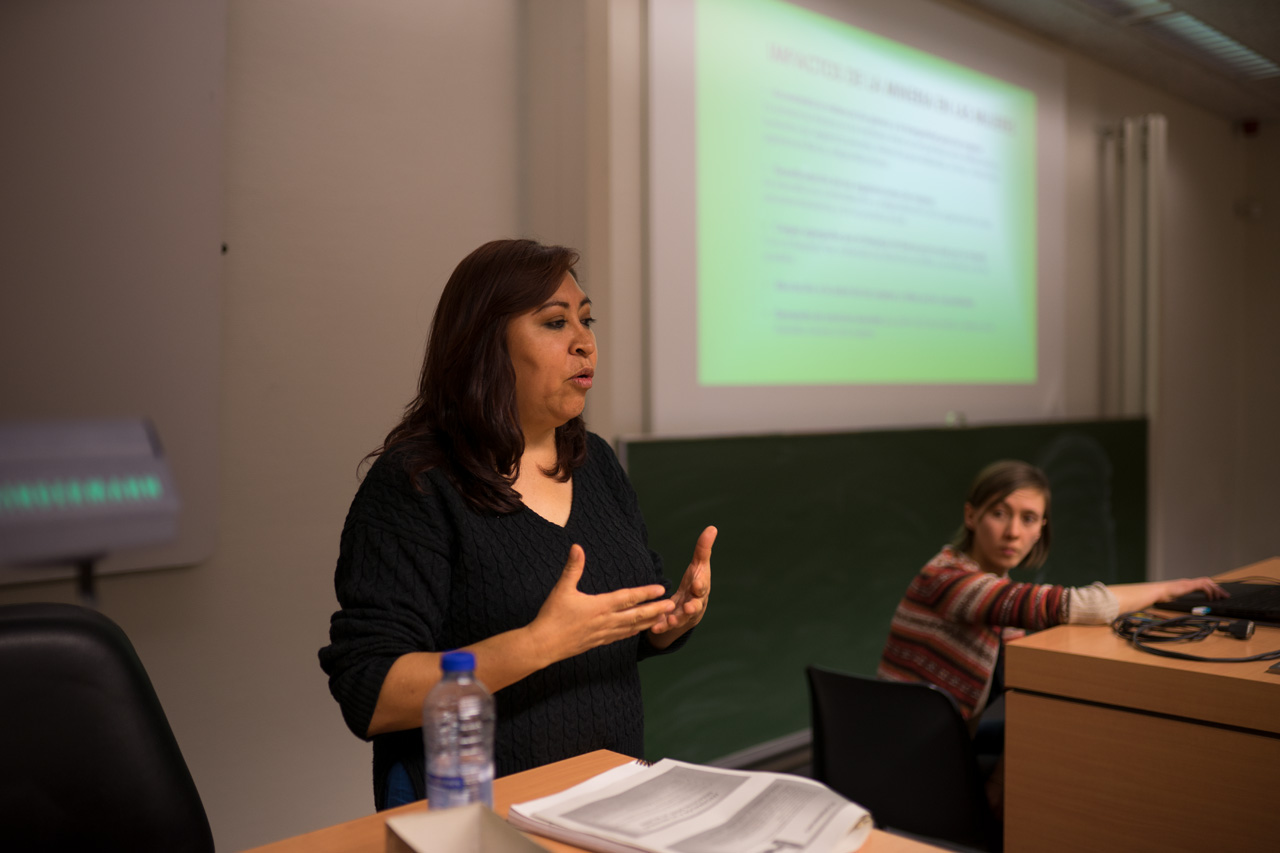
 his house torched to the ground, all because of his explicit opinion on mining and the defense of land. Eventually he disappeared when he was going to a meeting regarding the problems of mining. Five days later his body was found on the banks of the river Zamora on the level of bridge Chuchumbletza, a part of the region of influence of the Mirador project.
his house torched to the ground, all because of his explicit opinion on mining and the defense of land. Eventually he disappeared when he was going to a meeting regarding the problems of mining. Five days later his body was found on the banks of the river Zamora on the level of bridge Chuchumbletza, a part of the region of influence of the Mirador project.